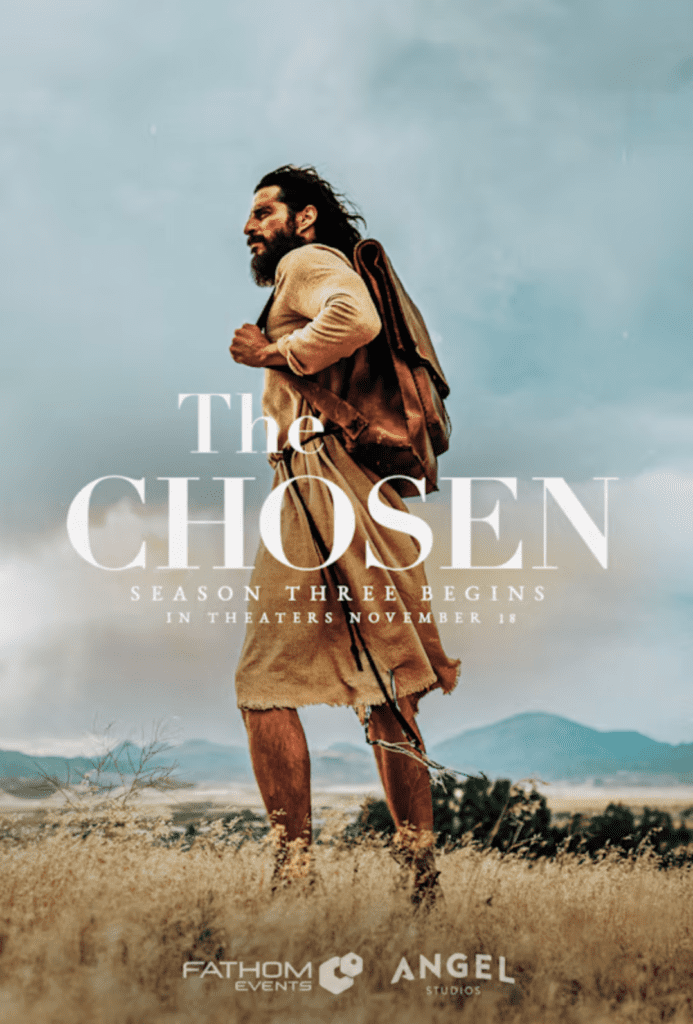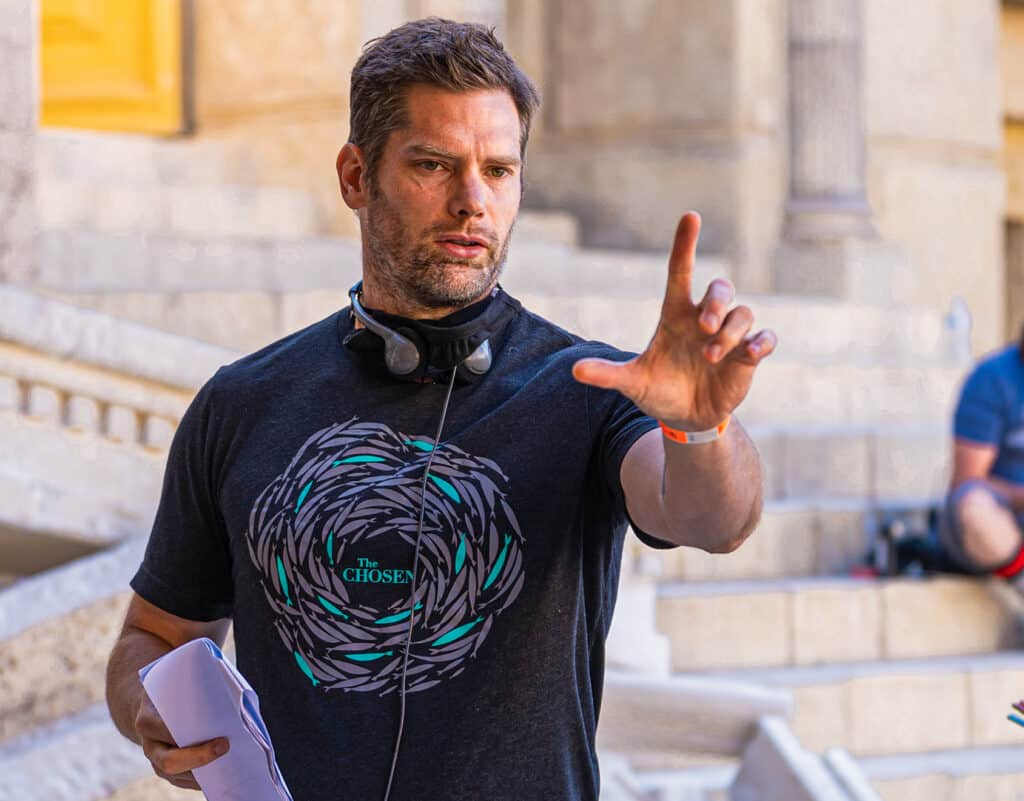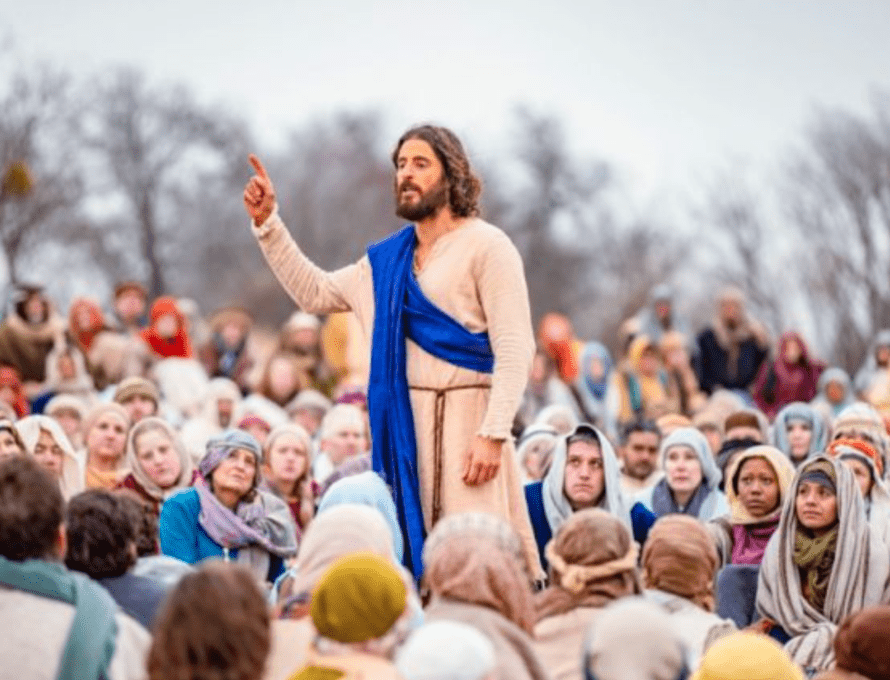EDITOR’S NOTE: Read more about Mormonism and its relation to biblical Christianity here and here.
MIDLOTHIAN, Texas – The third season of the popular – and very well-made – streaming show “The Chosen” is in full swing. Yet the performances, portrayals and dramatic adaptation of Jesus and His disciples remain in the background as controversy swirls around certain dialogue choices, the production company and the show’s creator’s alleged flirtations with Mormonism.
For those not in the know, “The Chosen” is an independent television show depicting the life of Christ through the eyes of His disciples. Its episodes range from 35 minutes to an hour in length. Seasons 1, 2 and most of three are available to stream for free through several sources, including at watch.angelstudios.com/thechosen.

The first two seasons of “The Chosen” were very enjoyable television, and the third season, which begins with Jesus’s Sermon on the Mount and the sending out of His disciples to begin ministry, is no different. I remain impressed that the layer of cheese that often accompanies “Christian” TV and movies is completely absent. The stories – even though I am very aware of the plot and ending – are incredibly engaging. The actors’ portrayals, especially that of Paras Patel’s Matthew, astonish. It’s fascinating to see how His disciples could spend so much time around Jesus and still not “get it.” At the end of a one-hour episode, I have little choice but to keep watching.
Controversy
But some have stopped watching.
The criticisms run a wide range. Some claim the mere attempt to physically depict Jesus is a violation of the second commandment. I’m no scholar, but I don’t believe most Missouri Baptists interpret Exodus 20 that way. Others say it’s blasphemous to present something based on Scripture that altered.
“The Chosen” is upfront in its approach to creating a scripted drama from God’s Word. Indeed, the first episode offers this important note: “‘The Chosen’ is based on the true stories of the Gospels of Jesus Christ. Some locations and timelines have been combined or condensed. Backstories and characters or dialogue have been added. However, all biblical and historical context and any artistic imagination are designed to support the truth and intention of the Scriptures. Viewers are encouraged to read the Gospels.”
I’ve argued that an unequivocal truth claim and an encouragement to read the Gospels are a very strong start for something that endeavors to be entertainment, not an expositional sermon. Dallas Jenkins, the creator and director of the series, has put it this way: “We take Bible stories, we work our way backwards to add the context, to add backstory: some of its historical, some of its cultural, some of its artistical imagination. All of it’s intended to support the character and intentions of the Gospels.” This explanation was good enough for me, though I understand if others feel it’s toe-ing the line of adding to Scripture.
Angel Studios
The most recent controversy – and to my mind the most serious – has to do with the statement Jenkins has made regarding Mormonism and a specific line of dialog from the new season’s third episode.
“The Chosen’s” distribution partner, a company called Angel Studios, does indeed count Mormons among its staff and leadership. Taken by itself, this is not a deal breaker for me. If I did business with only like-minded believers, I wouldn’t do much business at all. It’s also true that much of the filming has taken place in the LDS-stronghold of Utah, but if you’re looking for geography that matches first century Judea, you’d be hard pressed to find a better location for filming than Utah.
‘The LDS Issue’
Jenkins has not been silent about these questions and criticisms. He is well aware of the controversy, even dubbing it “The LDS Issue” in a video he shared last summer. “The LDS Issue” stems from a statement he made with a Mormon interviewer in 2020, where Jenkins referred to his Mormon “brothers and sisters” and noted that “we love the same Jesus.”
In his 2022 video, he offered a clarification: “Did it appear that I said that? Could it be easily interpreted that I said that? I think that’s true. I think we can agree that words matter and nuance matters. I probably could have given more context and clarity then…. I also think it’s true that it would have been a problem if I actually said those words definitively.”
I literally watched and heard those words come out of his mouth, and I can attest he actually said those words definitively, but I’m willing to cut him a little more slack and hear him out. He continues in his 2022 video:
“That would be a problem,” he said. “Not because there aren’t LDS folks who are Christians and not because there aren’t LDS folks who love the same Jesus, but because it would be wrong of me to say that any one group believes any one thing altogether. That is a level of arrogance I don’t have.”

Dallas Jenkins, the creator and writer of “The Chosen.” (Angel Studios photo)
I’ll interrupt here to be very clear and say that Mormons are not our brothers and sisters in Christ, and through the doctrine they’ve added to the Bible, they very clearly do not worship the same Jesus. (The Missouri Baptist Convention’s Rob Phillips has some excellent resources explaining why. You can find them by searching “Mormon” at mbcpathway.com. There’s also 13 more minutes to Jenkins’s statement, which you can find on YouTube by searching “My definitive (final) comments on the LDS Issue.”)
I see two possible conclusions based on his statement. Either Jenkins – who told Baptist Press last month he is himself a Baptist – believes some Mormons are Christians, or he is trying to parse words in such a way to give himself wiggle room to not offend his business partners and/or parts of his audience. Neither is good.
‘I am the law’
Finally, the third piece in the Mormon puzzle is a line from the third season’s third episode.
Jesus – wonderfully portrayed by Jonathan Roumie – is invited to read from a scroll in a synagogue only to be challenged by the local rabbi for His apparent blasphemy. Incensed, the rabbi threatens, “Jesus, if you do not renounce your words, we will have no choice but to follow the law of Moses,” insinuating He could be put to death. It’s a scenario not found in Scripture verbatim, but we can be pretty certain something similar played out in reality.
Jesus responds to the rabbi calmly: “I am the law of Moses.” Spoiler alert: the rabbi doesn’t take this well.
But, to quote Jenkins from his statement, “words matter.” And while those words “The Chosen’s” Jesus said don’t appear in the New Testament, something similar appears in the Book of Mormon’s 3 Nehi 15:9 “Behold, I am the law, and the light. Look unto me, and endure to the end, and ye shall live; for unto him that endureth to the end will I give eternal life.”
The line from the scene isn’t an exact match to the Book of Mormon verse – I wouldn’t have known of a possible connection to the Book of Mormon if it hadn’t been pointed out to me, and Jenkins said he wasn’t aware either. “It’s a cool line,” he said, and he’s right, it is “cool” (I can imagine Sylvester Stallone saying it in a 90s action movie.… Come to think of it, he did say it, in 1995’s Judge Dredd). Though we have no record of Jesus ever saying such a phrase, it also sort of makes sense given that we know He is the fulfillment of the law.
Let’s let Jenkins explain further: “It’s in the show because I believe it’s a really great line and I believe that it’s also theologically plausible. … The point is God is over these things. Jesus is over these things. He is these things. He owns these things. … It’s a theologically plausible line and, I believe, a cool, Jesus-as-king moment, and that’s it.”
While I lean very strongly that this was not intended to be a reference to the Book of Mormon, Jenkins should be incredibly careful when putting words in Jesus’s mouth (even after noting that the show is not on the same level as Scripture), and he should have offered a more definitive statement that he did not intend any connection to the Book of Mormon.
Viewer Beware
I like “The Chosen.” Still. I’m excited to finish the rest of the third season, and I don’t think the show’s Jesus is trying to sneak the Book of Mormon into my consciousness. And yet, while I could overlook any one of these three criticisms, I admit it’s becoming a lot to overlook the three of them combined.
I won’t criticize a believer who continues to watch and enjoy the show, but I can no longer argue with a believer who says the red flags are warning enough to stop watching. We must be careful and wise when it comes to the entertainment we consume, and doubly so when it involves the narrative of the Gospels.
Regardless, I think both of those parties – and even Jenkins – would agree: a television show cannot, must not, and will not ever replace Scripture

